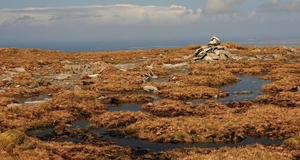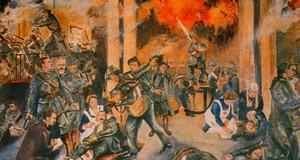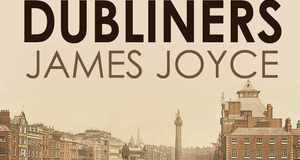James Joyce's "Ulysses" and Bloom's Utopian Vision of IrelandIf Bloom does not support the Irish cultural revival, is he still a nationalist? The Irish revival was ostensibly Roman Catholic; most Irish nationalists were also Catholic. Catholicism itself Joseph Valente describes as "the defining identification of Irish Ireland" in its separateness from the Protestant Orangemen (63). Bloom, however, is not Catholic, although he was once baptized as one in order to marry Molly. He has been baptized, twice, as a Protestant. His father, Rudolph Virag, was converted to Protestantism by the "Society for promoting Christianity among the jews" (U 17.1638-39). However, Bloom also renounced the Protestant faith at an early age. Bloom's sarcastic view of the Catholic mass is evident in "Lotus Eaters." Bloom would "prefer an ounce of opium" to submitting to Catholicism (U 5.327). He compares the mass to the "Lourdes cure" and the "waters of oblivion" (5.365), a ritual that "lulls all pain" (5.367-68). He also misunderstands the rituals of the mass, mistakenly thinking "I.N.R.I." and "I.H.S." (5.372) represent "Iron nails ran in" and "I have suffered," respectively (5.373-74). Bloom admits the mass would be "more interesting if you understood what it was all about," but he does not understand and has no desire to (5.423-24). Bloom is also a Freemason "in a country where the masonic lodges are the spearhead of anti-Catholic feeling" (Adams 103). The Roman Catholic Church was "opposed . . . to all organizations which required the taking of a secret oath," including Freemasonry (Hachey 13). Bloom's Irish counterparts do not consider him Catholic either. Martin Cunningham can only see Bloom as a Jew: "--We have all been there . . . His eyes met Mr. Bloom's eyes . . . --Well, nearly all of us" (U 6.259-61). To the Citizen and his cronies, Bloom is "a perverted Jew" (12.1635). During the funeral service for Paddy Dignam, Bloom is ironically placed with Tom Kernan, secretly an Orangeman, because both are Protestant: "Beside him again. We are the last. In the same boat" (6.662-63). This ironic placement makes Bloom appear sympathetic to the Orange movement, and therefore antagonistic to the Irish nationalist cause. He acknowledges his assent with Kernan's Protestant view of the Catholic service, but in Bloom's mind, he is neither Catholic nor Protestant. He focuses on the physicality of death: "The resurrection and the life. Once you are dead, you are dead" (6.667).If Leopold Bloom is not Catholic or Protestant, what is he? He is Jewish. However, even this identification is problematic. The orthodox definition of Jewishness is based on the mother's bloodlines. Bloom's father, Rudolph Virag, was a Hungarian Jew who emigrated to Ireland in the 1860s. Bloom's mother, however, was Ellen Higgins, an Irish Catholic. Technically, Bloom is not Jewish. He may defend his fellow Jews against the Citizen, but Bloom knows he is not Jewish. He tells Stephen, "I . . . told him his God, I mean Christ, was a jew too and all his family like me though in reality I'm not" (U 16.1084-85). Both Bloom and Stephen recognize that Bloom is not Jewish: "He thought that he thought that he was a jew whereas he knew that he knew that he knew that he was not" (17.530-31). Although Bloom is technically not Jewish, everyone sees him as such, including the Citizen. To the Irish Catholic world, one drop of Jewish blood equals a Jew. The Citizen states, "We want no more strangers in our house" (U12.1150-51). Bloom insists that he is Irish, that Ireland is his home, but the Citizen cannot accept that a Jew might also love his birth country: "Is he a jew or a gentile or a holy Roman or a swaddler . . . who is he?" (12.1631-32). The Citizen's wrath peaks when Bloom insists that Christ, the initiator of the Christian religion, was also Jewish: "By Jesus . . . I'll brain that bloody jewman for using the holy name" (12.1811). Sitting in the cabman's shelter with Stephen, Bloom recollects with gladness his insistence on Christ being Jewish, since the Jews are the Achilles heel of the Irish patriot, but he dons the mantle of Judaism only in defense. When he is himself, walking the streets of Dublin, his Jewish heritage is not important. Bloom's desire to consider himself Jewish stems from the guilt over his Jewish father's suicide. However, he knows little about Jewish rituals. He eats pork, a non-kosher food. Bloom sights another Hungarian Jew, Duglacz, who is ironically a "porkbutcher" (U 4.152), and desires to acknowledge their shared ethnic heritage, but says nothing. An ad for Agendath Netaim, a Zionist colony and "planters' company" in Israel (4.192), does not move him, though it frequently enters his mind. Jewish custom expected each Jew to produce a son and daughter who would also reproduce (Gifford 367). Technically, Bloom is a failed Jew: he has not produced a son and heir. Bloom's Judaism in conjunction with his Irish nationalist tendencies was deliberate on Joyce's part, for both Ireland and Israel were denied emancipation. In a letter to Carlo Linati, Joyce explains that Ulysses "is the epic of two races (Israel-Ireland) . . . as well as a little story of a day" (273). Joyce's description of Parnell as Moses strengthens the Irish-Jewish connection: "He, like another Moses, led a turbulent and volatile people out of the house of shame to the edge of the Promised Land" ("Shade" 193). Bloom relates "the headpiece" in Griffith's newspaper, of a "homerule sun rising up in the northwest" (U 4.103-4), with the emancipation of Israel. His utopian vision of independent Ireland, in "Circe," is of "the promised land of our common ancestors" (15.1517-18). In "Ithaca," Bloom compares his Jewish heritage with Stephen's Gaelic one; the attempt to unite Jew and Irishman, however, ultimately fails. Does Bloom's non-Catholicism, even his semi-atheism, prevent him from being an Irish nationalist? No. Although many Irish nationalists, and ninety percent of Dublin, were Catholic, other nationalists were not, the most famous ones being Charles Parnell, Wolfe Tone, and Douglas Hyde. However, Bloom's refusal to participate in the Catholic tradition also serves to alienate him from his Catholic nationalist acquaintances, including Cunningham and Simon Dedalus. They accept non-Catholics, such as Parnell, in the Irish nationalist movement, but the possibility of a Jew wanting home rule is too much. The semi-Catholic Stephen Dedalus, not accepted in Irish revival circles, is more tolerant; his initial acceptance of Bloom in "Ithaca" is a promising outlook for the new Ireland, when independence finally does come. Bloom does not wholly support the Irish cultural revival, but he is not a Fenian either. Fenianism was one of many nationalist movements in turn-of-the-century Ireland; its aim was "the violent overthrow of the British administration in Ireland" (Hachey 12). Martyrdom itself was "traditionally the highest expression of nationalism" (Fairhall 180), even though many Irish nationalists, including Parnell, Daniel O'Connell, and others did not support any type of violence to achieve home rule. Bloom is well aware of the violence of Irish political history, especially the tactics of Wolfe Tone and Robert Emmet. He knows the story of the Phoenix Park murders committed just a generation before, for which the Invincibles, a group that broke off from the Fenians, were responsible (Gifford 94). However, Bloom is unwilling to be a martyr: he hates physical aggression. Joyce himself described the multi-faceted Irish nationalist movement as a dual struggle "of the Irish nation against the English government, and the struggle . . . between the moderate nationalists and the so-called physical force party," which took such names as "the 'Invincibles' and the 'Fenians'" ("Fenianism" 138). Fenianism took a new name in the early 1900s: Sinn Fein, or "ourselves alone" (140). Bloom himself uses Sinn Fein "to mean . . . the Irish Republican Brotherhood," or the Fenians (Gifford 170). Martin Cunningham, however, credits Bloom with the idea of formulating Griffith's Sinn Fein, Ireland's national movement. If Bloom associated the name of Sinn Fein with the Fenians before Arthur Griffith took it up, his connection with Griffith becomes suspicious, because Bloom does not support the Fenians. Robert Martin Adams explains that Bloom's political connections are not always believable. Martin Cunningham, however, also credits Bloom with giving Arthur Griffith the idea of connecting Ireland's nationalist struggle with that of Hungary (U 12.1635-37). Arthur Griffith, like many of his fellow Irishmen in the 1900s, "was openly and vigorously anti-semitic" (103). Had he known Bloom's ancestry, he might not have been so understanding. Bloom is also a Freemason, a member of an anti-Catholic organization; Sinn Fein, however, begun by Griffith in 1906, was "pro-Catholic" (103). If either society knew Bloom's connection with the other, both would oust him. According to Robert Adams, Bloom's political ties are not realistic (103). Bloom's pacifism, in contrast to Fenianism, is evident in "Cyclops." The Citizen renounces the English who flog misbehaving sailors, but does not see that enforcing the same discipline, in Ireland, would have the same result: violence against human beings. The Citizen "cannot accuse the English of savagery unless he is more peace-loving and tolerant himself" (Nolan 101). Bloom's response is to renounce all persecution: "all the history of the world is full of it. Perpetuating national hatred among nations" (U 12.1417-18). Surrounded by violent, one-eyed nationalists, Bloom's view that "violence is natural to mankind" is a crime of "moderation" (Cixous 257). He rails against the injustice of persecuting the Jews, but refuses to "stand up to it . . . with force like men" (U 12.1475). Instead, Bloom insists that using physical violence is not the answer; the only answer is "love . . . the opposite of hatred" (12.1485), and the only "force beyond nationalism" (Cixous 254).Continued on Next Page » Suggested Reading from Inquiries Journal
Inquiries Journal provides undergraduate and graduate students around the world a platform for the wide dissemination of academic work over a range of core disciplines. Representing the work of students from hundreds of institutions around the globe, Inquiries Journal's large database of academic articles is completely free. Learn more | Blog | Submit Latest in Literature |
















